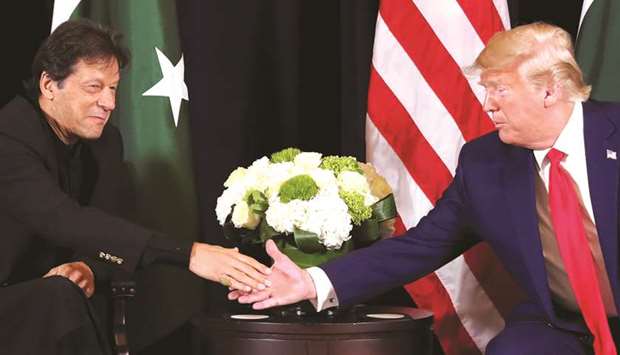President Donald Trump’s joint presser with Prime Minister Imran Khan on Monday ahead of the 74th UN General Assembly session in New York is a strong indicator that his administration is deeply interested in keeping Islamabad on its side. The evident personal bond between the two leaders augurs well for the bilaterals and reinforces the relationship reset which has been in order for some time now.
To his credit, Imran Khan has been able to get Pakistan back into business against all odds and every engagement since his epoch-making visit to the White House two months ago has remarkably improved ties, which lay in virtual cold storage at this time last year with heated exchange of tweets between him and US President Donald Trump over Islamabad’s role in the fight against terror.
With little consideration for diplomatic rulebook, Trump had back then accused Pakistan of not doing anything for the US despite all the aid, he felt, his predecessors lavished on Islamabad in the war on terror. But unlike the past when Islamabad’s official reaction was mostly guarded, Khan responded in kind and drew the full visage of the sacrifices his country rendered in helming the global fight against terror with negative consequences for political and economic stability at home.
In a series of tweets, the prime minister laid out the scorecard of losses, in man and material terms, that Islamabad endured to help the US-led coalition in Afghanistan and flayed the ungratefulness in no uncertain terms. With the moribund state of relations, it would have been considered foolhardy to bet on a turnaround at the time. Yet, Trump began to realise in the succeeding months that the narrow path he had initially taken to shut the doors on Islamabad would be completely counterproductive to his long-held desire to recall American troops from a draining and morale-sapping war in Afghanistan.
With an eye for presidential re-election next year, he felt his best chance would be a re-engagement with Pakistan as a calibrated partner to solve the Afghan imbroglio. Despite his earlier strong rhetoric on taking the Taliban to the cleaners, Trump was finally drawn to the conclusion that his administration would be better off negotiating with the Taliban. In this studied endeavour, Islamabad’s role was deemed crucial thanks to its influence over Taliban.
A re-engagement eventually paved the way for the unlikely White House rendezvous between President Trump and Prime Minister Khan in July, and which led to a surprisingly candid meeting. It was preceded by a rock star-like reception in Washington’s famous Capital One Arena for the celebrity prime minister, whose reverberations were felt deep with even Secretary of State Mike Pompeo making that his first point of reference in talks with him. It appeared to make an impact on Trump as well, who, referred to the Pakistani leader’s “popularity” and “leadership” role in charting a new course.
The surprise package, of course was the claim Trump made about having been asked by Indian Prime Minister Narendra Modi for “mediation” on the Kashmir issue, which New Delhi swiftly denied. But in what appears to be a crafty attempt to raise his global profile as a peacemaker, Trump has continued to offer his good offices, mostly at Khan’s bidding — as was evident in the New York meeting as well — “should both Islamabad and New Delhi be willing”.
Monday’s meeting also saw Khan making yet another attempt to convince Trump to re-engage with the Taliban after the latter called off the talks in an apparent huff over the killing of an American sergeant in the Afghan capital Kabul in a bomb attack claimed by the Taliban earlier this month.
Political pundits however, conjectured it was done to offset the impression that Trump had ceded too much ground to the militia after he disclosed in a tweet that he had planned to host peace negotiations at the presidential compound in Camp David, Maryland, involving Taliban’s “major leaders” and the Afghan president as well.
The move is seen as a setback with key stakeholders, Islamabad in particular, keen to see their investment of more than a year in making it possible for both the US and Taliban to resolve their differences with give-and-take in a post-pullout scenario. Prime Minister Khan, of course is an avowed proponent of a peace deal since his early days as a firebrand opposition leader. With him at the helm now, and strong backing from the powerful military, there is a fresh impetus to obviate any possible fissures.
It would appear Trump comprehends the scale of adversity American forces and its allies would confront in the event of things going south. His decision to meet Khan again and lend gravitas to it by holding a joint presser appears to be consistent with the idea of leaning on Islamabad to provide a peaceful exit and hold on to the gains in its aftermath.
Moving on to other issues of enormous geo-political importance, even though Trump has continued to raise a fever pitch about Iran with the ongoing tensions in the Middle East; creditably, Khan is proactively pushing for sense to prevail on all sides, warning of the dangers of instability in its wake whilst holding forth in a number of key engagements with American stakeholders and think-tanks.
With his much awaited address to the UN General Assembly on Friday, stakeholders back home will draw considerable satisfaction from Prime Minister Khan’s efforts to solidify the recent gains in Islamabad’s foreign policy reset whether President Trump realises his desire for winning a Nobel or not!
* The writer is Community Editor. He may be reached at [email protected]

Re-engagement: Prime Minister Imran Khan shakes hands with President Donald Trump ahead of the annual UN General Assembly session in New York.

